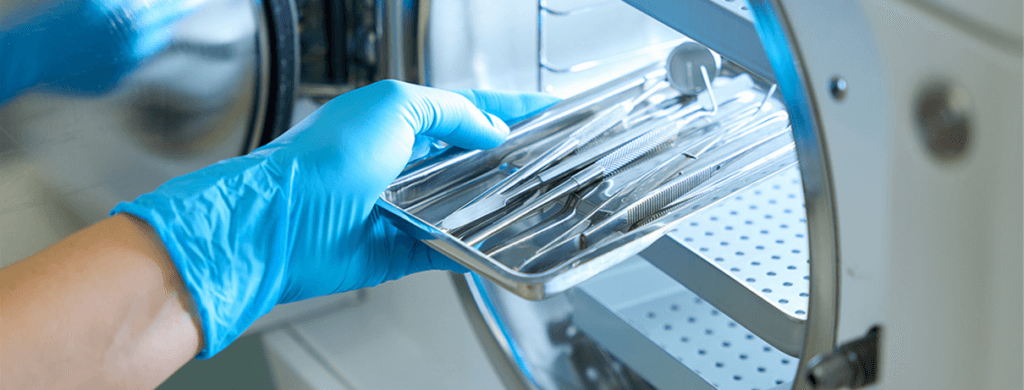
Become a Sterile Processing Technician and get CRCST Certified
Begin a critical healthcare career as a certified sterile processing technician (SPT). Sterile Processing Technicians, also known as Central Service Technicians, prevent infection by sterilizing, cleaning, processing, assembling, storing, and distributing medical supplies. This 100% online sterile processing technician course will train you to work as an SPT and will also prepare you for the Certified Registered Central Service Technician (CRCST) certification offered by the Healthcare Sterile Processing Association (HSPA)—all in 12 months or less.
You will learn all the necessary steps required to perform the duties and tasks of an SPT as you gain confidence to begin your new career. Gain proficiency in the step-by-step requirements of the sterilization process and fully prepare to pass the CRCST exam. A voucher for the exam is included in the cost of your course.
Job Outlook for Sterile Processing Technicians
- The U.S. Bureau of Labor Statistics (BLS) estimates that job demand for sterile processing technicians and similar positions will increase by 6% through 2031. It estimates that 7,700 jobs will be opened each year in this job category.
- The BLS reports that medical equipment preparers earn an average salary of $42,420 per year, with the top earners pulling in over $60,000.
- According to the BLS, California, New York, Texas, Ohio, and Florida are among the states with the highest employment in this field.
Sterile Processing Technician/Central Service Technician FAQ
A sterile processing technician, also known as a central services technician, is responsible for preventing infection by sterilizing, cleaning, processing, assembling, storing, and distributing medical supplies and equipment. These professionals play a critical role in healthcare.
The Certified Registered Central Service Technician (CRCST) is a certification granted by the Healthcare Sterile Processing Association (HSPA). The CRCST is a certification program designed for entry-level and existing technicians who demonstrate the knowledge, experience, and skills needed to show competence as a sterile processing technician.
Course Objectives
- Define the sterile processor role, responsibilities, professional skill set, and communication expectations (including accurate use of medical terminology and anatomy) required in the central processing and surgical services departments.
- Identify sterile processing regulations and standards providing by regulatory agencies and professional associations to ensure workplace safety, infection prevention, and proper support for the ancillary departments.
- Discuss basic procedures and best practices for each phase of sterile processing, including decontamination, inspection, preparation, and sterilization of medical instruments and supplies.
- Understand sterile storage considerations, guidelines, concerns, and common quality assurance procedures in the sterile processing department.
- Discuss the importance of following procedures to care for loaner instruments and manage inventory while using information management systems.
- Describe how to adhere to compliance when handling documentation and maintaining records.
- Explain the importance of effective communication, human relations, and personal development and how improving these skills can impact the career of a sterile processing technician.
- Understand all the tasks related to the role and responsibilities of an SPT.
Prerequisites and Requirements
To sit for the national certification exam, candidates must have a high school diploma or equivalent; it is recommended that you have this before enrolling in this program.
Curriculum
- Medical Terminology
- Introduction to Medical Terminology
- The Musculoskeletal System
- The Cardiovascular System
- The Lymphatic and Immune Systems
- The Respiratory System
- The Digestive System
- The Urinary System
- The Nervous System
- The Special Senses The Eyes and Ears
- The Integumentary System
- The Endocrine System
- The Reproductive System
- Diagnostic Procedures, Nuclear Medicine, Pharmacology
- Sterile Processing Technician
- Introduction
- Infection Control, Standards, and Regulations
- Decontamination and Workplace Safety
- Disinfection Process and Complex Instrumentation
- Tray Assembly
- Prep and Pack
- Introduction to Sterilization
- Introduction to Low-Temperature Sterilization
- Instrumentation Identification (Part I)
- Instrumentation Identification (Part II)
- Case Cart Introduction
- Sterile Storage
- Managing Inventory
- Ancillary Department Support
- Important Components for a Successful Career
- Wrapping Up and Preparing for Your Exam
Instructors
Janice Brownlee has been a Certified Surgical Technologist (CST) for 43 years and has worked in all sizes of hospitals, including surgery centers. Jan worked in a sterile processing department in the instrument room and sterile supply areas. While working in the operating room, she scrubbed all services, with cardiothoracic, vascular, and orthopedics being her favorites.
Jan also had the opportunity to work for a private group of cardiothoracic surgeons and expand her knowledge and skills even more. Working as a surgical first assistant was the highlight of her career. She has continued her career path by teaching surgical technology and sterile processing at a local community college and enjoys watching her students learn and grow.
Teresa Nicolich holds a Master of Science (MS) in Human Services Leadership and a Bachelor of Arts (BA) in American Studies, with a minor in Communications & Journalism. Teresa is a Certified Registered Central Service Technician, certified by the Healthcare Sterile Processing Association (HSPA), formerly the International Association of Healthcare Central Service Materiel Management (IAHCSMM).
Teresa has 30 years of experience in healthcare central supply and sterile processing central sterile technician programs providing course development, education, instruction, orientation, and staff training and development for the healthcare facility.
Registration and Enrollment
This course is open enrollment. You can enroll and begin anytime.
- Workforce Education
- Workforce Education Inquiry Form
- Career Training Programs
- Advanced Career Training Programs
- Social Media and Mobile Marketing Training
- Sterile Processing Technician
- Bookkeeping and QuickBooks Training
- AutoCAD Certification
- Certified Medical Administrative Assistant
- Clinical Medical Assistant Training
- CompTIA IT Certification Training
- Patient Care Technician Training
- Pharmacy Technician Course
- Medical Billing and Coding Training
- Bootcamps
- Advanced Career Training Programs
- Dental Continuing Education
- Corporate and Customized Training
- Healthcare Training Programs
- Education Training Programs
- Expanded Function Dental Auxiliary
- WorkReadyNH Program


